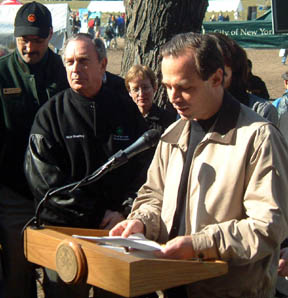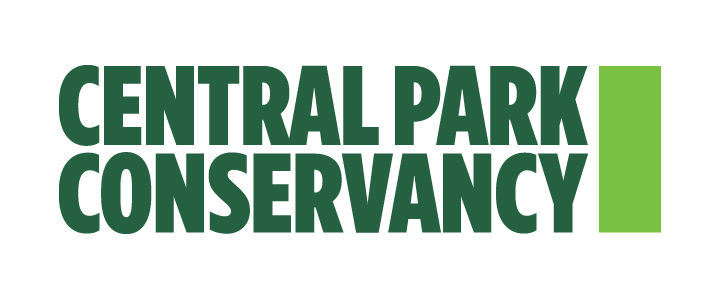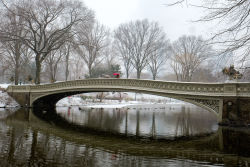Central Park
The Daily Plant : Thursday, February 14, 2002
CENTRAL PARK PLAYS HOST TO CRIPPLING BEETLE

On Saturday, February 9, it was announced that the Asian Longhorned beetle was discovered in Central Park. In a press conference following the kick-off of Winter Festival 2002, Mayor Bloomberg and Commissioner Benepe revealed this information to members of the press. Also on hand were Fiona Watt, Chief of Central Forestry; Bill Hawks, Undersecretary of the United States Department of Agriculture for Marketing and Regulatory Programs; and Doug Blonsky, Central Park Administrator.
The two infected trees, a Sugar maple and a Norway maple, are located near the pond at the southern end of Central Park. Hardwood trees, which account for almost 50% of all trees in Central Park, are this beetle’s potential host. Central Park, New York City’s 5th largest park and the largest in Manhattan, houses about 26,000 trees, 12,000 of which could potentially be destroyed if the Asian Longhorned beetle isn’t dealt with appropriately. Capturing the gravity of this discovery, Fiona Watt said, "in the blink of an eye, the beetle can destroy a forested landscape that has taken 50 to 100 years to mature."
Parkies can help fight this beetle battle by looking for the beetle in their neighborhood. It is ¾ to 1 ¼ inches long and is shiny black with white spots. Its black-and-white striped antennae are 1 ½ to 2 ½ times as long as the beetle's body. The adult beetles are usually present from May through October. Looking at hardwood trees themselves can reveal crucial information in the battle. Signs of Asian Longhorned beetle infestation are round holes in the bark of trunks and large branches in hardwood trees such as maple, birch, elm, and willow trees. Female beetles chew their way into trees and lay eggs. Those larvae then tunnel through the bark, resulting in the accumulation of coarse sawdust around the base of the tree. The beetle then emerges from the bark and leaves an exit hole on the trunk and branches that’s about 3/8" in diameter. In summary, look for holes all over the trunk and branches of tree, as well as sawdust surrounding it’s base, in your neighborhood and on your property.
This spring the United States Department of Agriculture plans to inject 80,000 trees, up from 10,000 last spring, with the pesticide Imidacloprid. "Although the loss of 3,545 trees in Brooklyn, Manhattan and Queens is disheartening, we are hopeful about the tree injection program that began last year to protect healthy trees from the beetle," said Fiona Watt. The Asian Longhorned beetle was first discovered in Greenpoint, Brooklyn and was believed to have come from China inside wood packing material in 1996. The infestation in Central Park was discovered on a routine survey of the area, proving the benefits of such preventative measures.
For more information, please visit the Parks website at www.nyc.gov/parks. Infested trees have been discovered in parks and private property in Manhattan, Brooklyn and Queens. Should you have any questions or believe you have found the Asian Longhorned beetle, please call (800)201-PARK.
THIRTEEN YEARS AGO IN THE PLANT
(Thursday, February 23, 1989)
PARKS EMPLOYEES HONORED DURING ARSENAL CEREMONY
Whether you rake leaves, prune trees, paint benches or clean pools, your Parks job is important. That was the message from agency managers to more than 150 Parkies crammed into the Arsenal Gallery for the Second Annual Employee Awards Ceremony.
QUOTATION FOR THE DAY
"Not marble, nor the gilded monuments
Of princes, shall outlive this powerful rhyme;
But you shall shine more bright in these contents
Than unswept stone, besmear'd with sluttish time.
When wasteful war shall statues overturn,
And broils root out the work of masonry,
Nor Mars his sword nor war's quick fire shall burn
The living record of your memory.
'Gainst death and all oblivious enmity
Shall you pace forth; your praise shall still find room,
Even in the eyes of all posterity
That wear this world out to the ending doom.
So, till the judgment that yourself arise,
You live in this, and dwell in lovers' eyes."
William Shakespeare
(1564-1616)
HAPPY VALENTINE’S DAY













